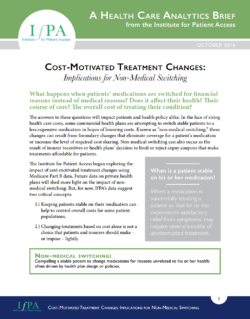Cost-Motivated Treatment Changes: Implications for Non-Medical Switching
October 23, 2016
 What happens when patients’ medications are switched for financial
What happens when patients’ medications are switched for financial
reasons instead of medical reasons? Does it affect their health? Their
course of care? The overall cost of treating their condition?
The answers to these questions will impact patients and health policy alike. In the face of rising health care costs, some commercial health plans are attempting to switch stable patients to a less expensive medication in hopes of lowering costs. Known as “non-medical switching,” these changes can result from formulary changes that eliminate coverage for a patient’s medication or increase the level of required cost sharing. Non-medical switching can also occur as the result of insurer incentives or health plans’ decision to limit or reject copay coupons that make treatments affordable for patients.
The Institute for Patient Access began exploring the impact of cost-motivated treatment changes using Medicare Part B data. Future data on private health plans will shed more light on the impact of nonmedical switching. But, for now, IfPA’s data suggest two critical concepts:
1.) Keeping patients stable on their medication can help to control overall costs for some patient populations.
2.) Changing treatments based on cost alone is not a choice that patients and insurers should make – or impose – lightly.
Tags: Non-Medical SwitchingCategorized in: Analysis

